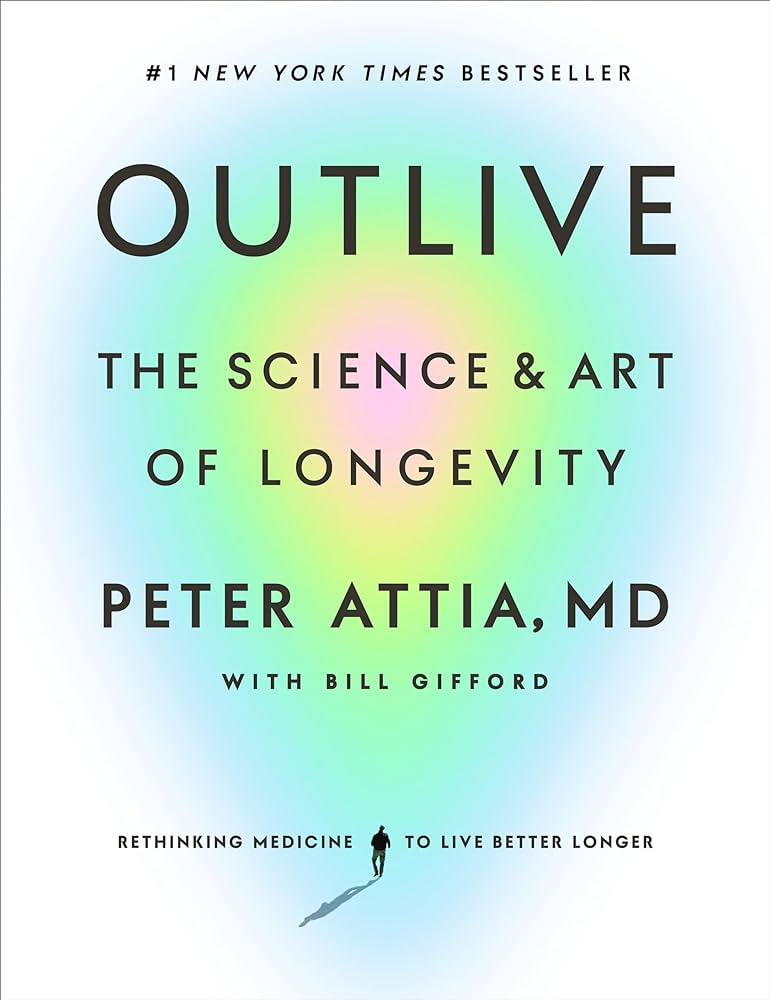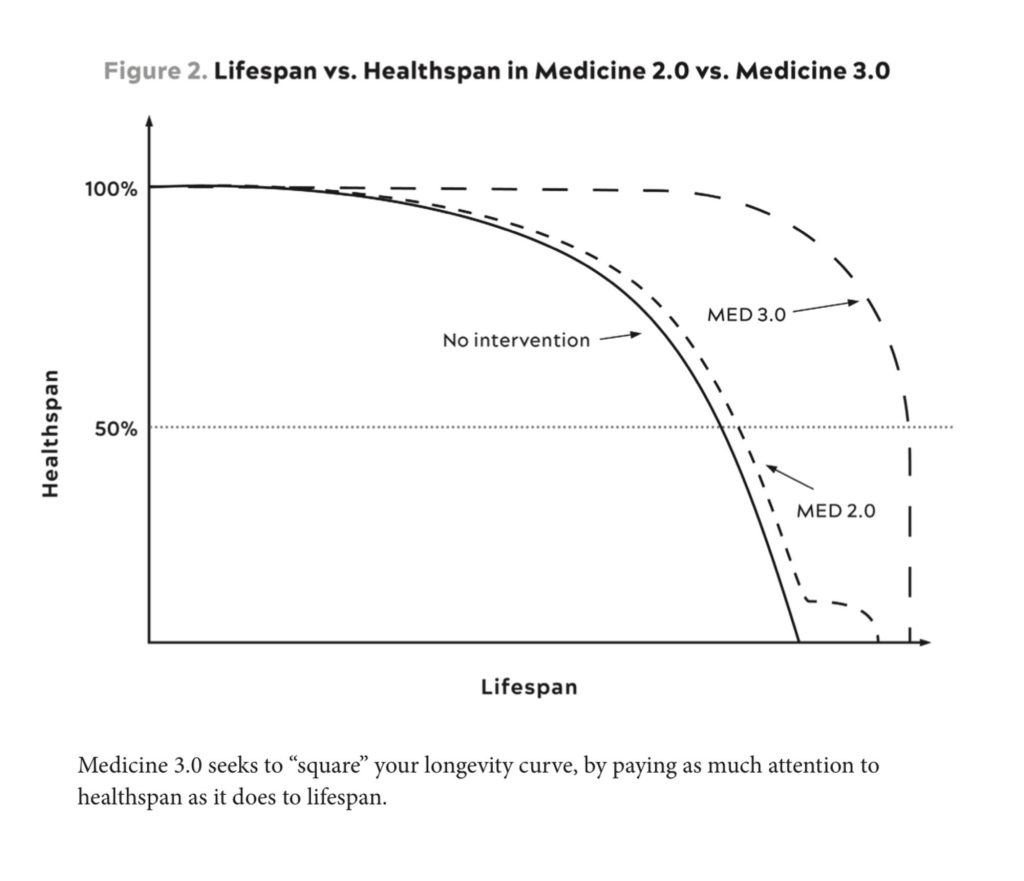
Review
It took me a few attempts to get through this book. I’ve long believed the way we think about healthcare is a little upside down, and this book provides a clear articulation of why.
You can’t help but reclaim some control and responsibility over the future of your health. There are things we can do today to reduce the chance of heart disease, cancer or neurodegenerative disease taking us early. We now have a good reason to train and eat well. As for the best way to do that? Clearly there are no shortcuts. Time to step away form keyboard, and get to the gym!
Key Takeaways
The 20% that gave me 80% of the value:
- Life span is how long you live. Health span is how long you have a high quality of life
- We should be optimizing for health span = time + health
- The 4 horseman account for 80% of deaths in people over 50 who do not smoke…
- Cardiovascular disease and cerebrovascular disease
- Cancer
- Neurodegenerative diseases (e.g. Alzheimer’s)
- Foundational disease (e.g. the continuum hyperinsulinemia → insulin resistance → fatty liver disease → type 2 diabetes)
- You can change your trajectory if you take the right steps now:
- you can increase your lifespan by 10 years
- you can increase your health span by 20 years
- Three Era’s of medicine:
- 1.0 Hippocrates said disease came from the environment not the gods. But mechanisms weren’t understood. Medicine 1.0 was largely guesswork and observation.
- 2.0 The scientific method. Germ theory, antibiotics and improved sanitation. Lifespan increased but little preventative treatment. Medicine is still a reaction to something going wrong.
- 3.0 A focus on prevention. Patients are individuals. The risk of doing nothing is considered. The realization that health span is more important than lifespan. Treatment is part of our daily life (nutrition, diet, exercise, sleep, emotional health)
- What do you want your endgame to look like?

- We should be proactive not reactive. Start treatment as early as possible. Extend our quality years. Medicine 2.0 delays death without improving quality of life.
- Breaks exercise into:
- Strength
- Stability
- Aerobic efficiency (endurance)
- Peak aerobic capability (intensity)
- Ultimately, to increase your health span, you should aim to be fitter and stronger that most people who are 10 years your junior. That’s going to take some work and requires getting into the top few % of your age group.
- The Randomized Controlled Trial is he cornerstone of Medicine 2.0, but it’s really hard to do for exercise, sleep and nutrition over long enough time horizons. Medicine 3.0 therefore has to draw on other techniques like animal studies, studying human outliers and the 4 main causes of death.
- Therefore medicine 3.0 is more about probability and risk
- At any one point, there are only about 300 people alive over 110 years old
- More people become a billionaire than live to 110
- Only one person has been verified to have lived 120 years
- The goal is to phase shift → to delay on the onset of disease by decades
- Two key tactics:
- Early disease specific prevention
- Early general prevention (all the 4 horseman)
- We have a nutrition problem. Our bodies haven’t evolved to cope with the standard modern diet (which is unhealthy).
- 42% of Americans are obese, 11% have diabetes, 50% have Type 2 diabetes or are on the path to having it.
- Diabetes increases the risk of cancer, Alzheimer’s and heart disease
- Insulin resistance is a big problem and brings cancer, diabetes and obesity.
- Metabolic disorders are a continuum. Look for the warning signs in your bio markers.Elevated insulin (spikes) is a strong signal that you have insulin resistance
- Don’t consume more calories that you need
- Only when type 2 diabetes has been diagnosed do we do anything (really bad idea)
- Metabolic dysfunction can be stopped by diet, exercise and sleep. They require effort to escape the modern environment
- Heart disease kills more than anything else (inc. cancer).
- If your overweight and a little insulin resistant your heart might be calcifying
- Heart disease is more preventable than the others. It should be the 10th leading cause of death, not the first
- Most of the cholesterol in our system is produced by our own cells, and doesn’t come from our food. YET we steer people away from foods that are high in cholesterol
- There’s no correlation between cholesterol in food and cholesterol in blood (unless you’re a chicken or rabbit)
- 50% of heart attacks occur in people under 65
- Insulin resistance and inflammation are risk factors for heart disease
- Fat → Heart attacks → Strokes → Dementia
- Diet is the best way to lower triglycerides and stabilize insulin
- Start early → in your 30s.
- Cancer and heart disease together account for 1 in 2 deaths
- Cancer still kills at about the same rate it did 50 years ago. Once cancer is established, we’re not great at treating it.
- 3 part strategy: prevention, new smarter treatments, earlier detection (colonoscopy, blood tests)
- Obesity and diabetes increase the chance that you’ll get cancer. Not being insulin resistant or type 2 diabetic → its almost as important as quitting smoking
- A strict diet of no added sugar and no carbohydrates could slow / stop cancer
- Early detection is our best chance
- With diagnostic tests there’s a tradeoff between sensitivity (ability of the test to detect an existing condition) and specificity (the ability to determine that somebody doesn’t have the condition)
- Sensitivity is the true positives
- Specificity is the true negatives
- The most common gene linked to late-onset Alzheimer’s disease is a risk gene called (APOE).
- APOE e2 is least common and reduces the risk of Alzheimer’s.
- APOE e4 is a little more common and increases the risk of Alzheimer’s
- If you have E/4 E/4 you’re 12x more likely to develop Alzheimer’s disease
- 2% of the population have this gene
- Parkinson’s is largely physical, dementia is largely mental… all though they both do the other in the later stages.
- Prevention is our only hope with neurodegenerative diseases:
- Mediterranean diet, cut out alcohol, exercise, sleep, social interaction, sauna, brushing and flossing teeth
- Medicine 2.0 can’t help dementia → so embrace 3.0
- Adopt a preventative approach
- What’s good for the heart is good for the brain (vascular health)
- Metabolic health is key
- Start early, time is key
- Exercise is the most important
The 5 Key Domains
| Exercise | Aerobic efficiency: 4 sessions a week, 45mins in Zone 2 V02 Max: 2 sessions a week, 4 min max intervals & 4min recoveries Strength: Heavy weight training, Rucking, rowing, eccentric, hip hinging, split stance Romanian deadlifts Stability: 2 sessions a week, 1 hour. Pushups, feet, spine, shoulders, hands, yoga |
| Nutrition | Calories matter, try calorie counting. Don’t eat too many or too few Consume sufficient protein and fats Obtain the vitamins + minerals you need Mediterranean diet → nuts and olive oil Compliance is the key, so it has to work for you If you’re already metabolically healthy, you don’t need to restrict calories Alcohol serves no nutritional or health purpose Extra carbohydrates are the problem, elevated glucose increases risks of the horseman Try to lower average blood glucose, and reduce the variability from hour to hour Eat 1.6g of protein per kg of bodyweight per day If you didn’t sleep well, or are stressed, you must eat healthy, don’t spike your blood sugar Eat more olive oil, avocado and nuts Only use fasting if nothing else has worked Don’t overthink nutrition, go outside and exercise instead |
| Sleep | Fix wake up time Don’t clock watch Blackout bedroom and keep it cool Take a bath or sauna before bed Meditate before bed Avoid caffeine after lunch No active screen use within 60mins of bed (Kindle is OK) Cultivate sleep pressure (exercise, and spend less time in bed) Don’t eat 3 hours before bed Get 7.5 to 8 hours per night |
| Emotional Health | DBT techniques: Emotional Regulation Distress tolerance: expand your tolerance window (exercise, sleep, nutrition, time with family, medication, social time, recreational activities) Stop shrinking your window: learn to say no (don’t take on too much) Interpersonal effectiveness Self management Are you kind to yourself? Listen to yourself talk |
| Exogenous Molecules Drugs & Supplements | (Nothing of note here) |